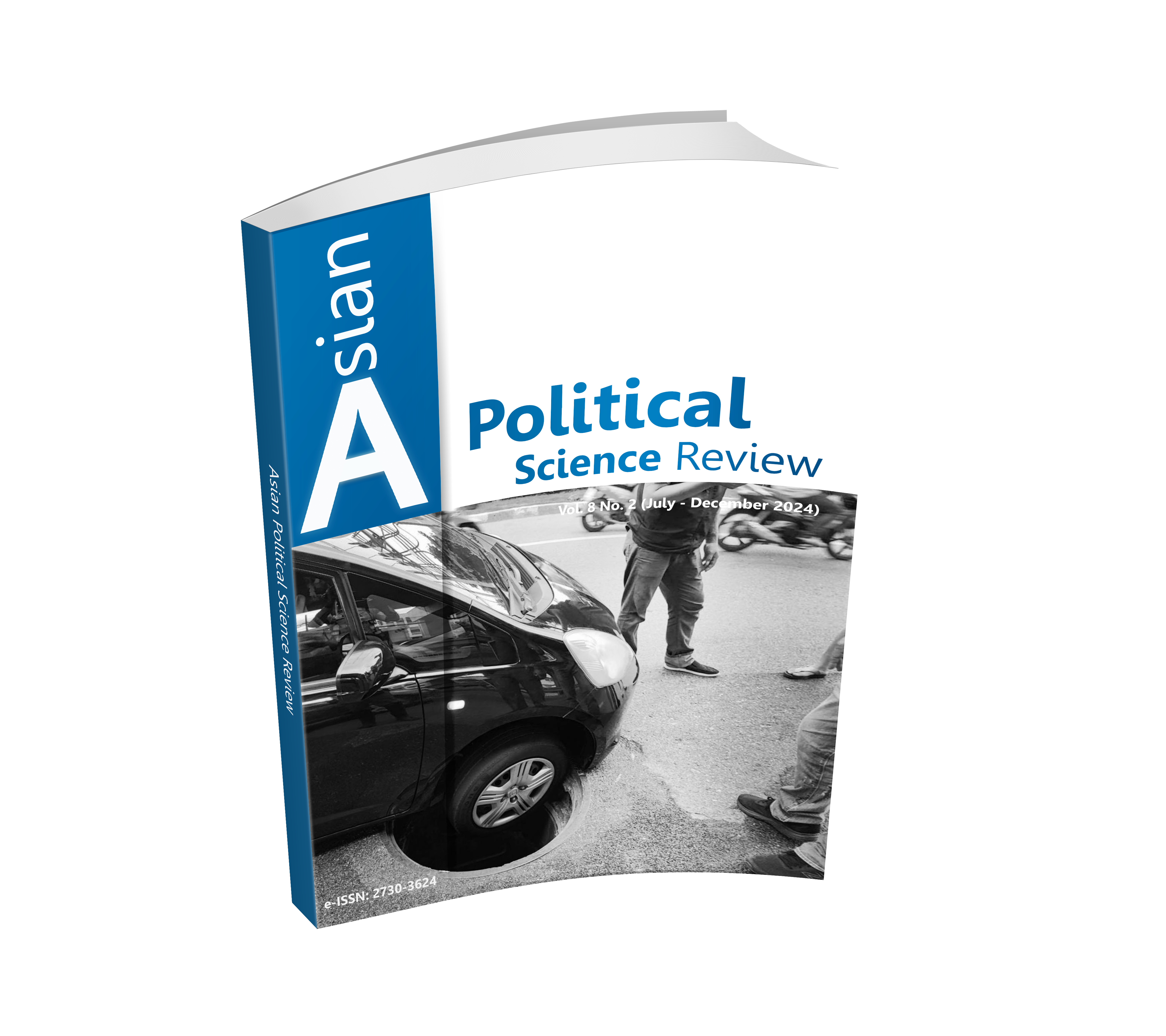POLITICAL AND ECONOMIC IMPLICATIONS OF STATE ADMINISTRATION ACT: A STUDY OF SOUTHERN BORDER PROVINCES OF THAILAND
DOI:
https://doi.org/10.14456/apsr.2024.13Keywords:
Political & Economic Implications of Administration, State Administration, State Administration Acts, Southern Border Provinces, ThailandAbstract
The present study was carried out with three objectives 1) To study the political and economic implications of past state administration acts; 2) To study the political and economic implications of current state administration act; 3) To give suggestions for future state administration act formation. It is observed that Globalization affects Thailand, resulting in the state administration's actions having political and economic implications for the Southern Border Provinces. There is an ongoing effort to propose a constitutional amendment that is expected to impact the state administration model in Thailand. According to the current constitution, any amendment to the constitution must undergo a referendum. According to the respondents, 579 Yala Rajabhat University students and 27 experts, the majority opinion that all three forms of public administration namely Central, Provincial, and local should not be changed. Currently, the existing format is functioning effectively but requires some urgent improvements based on upholding the principle of Thailand as an indivisible kingdom, honoring and treating Thailand's monarchy. The study recommended the government on many issues such as: enhancing law enforcement; Government and officials should focus on preventing and solving deficiencies in duty; expediting the elimination of redundant tasks; distributing responsibilities and budgets more efficiently; ensuring fair access and convenience for the people; and actively combating and eradicating corruption.
Downloads
References
Aiyara, T. (2013). State, Market and Globalization: A Brief History of Global Economic Order. Songklanakarin Journal of Social Sciences and Humanities, 19(2), 3-56.
Anumanrathon, M. (2010). Public Policy. Bangkok: ExpernetBooks.
Berman, E. (2011). Public Administration in Southeast Asia: Thailand, Philippines, Malaysia, Hong Kong, and Macao. New York: Routledge.
Bowonwattana, P. (1981). Worldviews of Thai academics’ public administration. Thai Journal of Development Administration NIDA, 4(19), 545-565.
Chaiyotha, D. (2003). Thai History: Prehistoric Era to the End of Sukhothai Kingdom. Bangkok: Odeon Store Publishing House.
Chantawimon, A. (2003). History of Thailand. 4th ed. Bangkok: Thai Alphabet Printing.
Chutinaranon, S. (2009). The Second Battle of Ayutthaya 1767. 8th ed. Bangkok: Matichon Publishing House.
Constitution of the Kingdom of Thailand 2017.
Dantrakul, S. (2009). Revolution, Democracy, 24 June 1932. 2nd ed. Nonthaburi: Institute of Social Sciences.
Dye, T. (2016). Understanding Public Policy. London: Pearson.
Friedman, T. (2012). The Lexus and the Olive Tree: Understanding Globalization. Ontario: Picador.
Gohwong, S. (2016). Thai Bureaucracy Under Globalization. Kasetsart University Political Science Review Journal, 3(1), 43-64.
Hoffmann, S. (2002). Clash of Globalizations. Foreign Affairs, 81(4), 104-115.
Kanchanakongka, A. (2023). Kingdom of Ayutthaya, Part 1. Retrieved from http://huexonline.com/knowledge/19/151/.
Khunthongchan, S. (2016). Relationships between Globalization and Basic Values of Thai Society. Humanities and Social Sciences Journal, Ubon Ratchathani Rajabhat University, 7(1), 160-185.
Kijkuakul, S. (2018). Qualitative Research: A Distinguished Paradigm and Misconceptions. Journal of Education Naresuan University, 20(1), 272-283.
Kosakornwichran, P. (1913). Analyzes the Former Thai City. Bangkok: Charoensin Printing.
Krauss, W. (1974). Political Implications of Gender Roles: A Review of the Literature. The American Political Science Review, 68(4), 1706-1723.
Kuhn, T. (1970). The Structure of Scientific Revolutions. 2nd ed. Chicago: University of Chicago Press.
Mhuentoei, T. (2020). Thailand’s E-Government: Changing Definition and Development. Inthaninthaksin Journal, 15(2), 129-152.
Mukonza, R. (2014). E-Governance: A New Paradigm in Public Administration. Journal of Public Administration, 49(2), 499-511.
Phawakaraphan, P. (2018). Thai foreign affairs in the Cold War era. Bangkok: Chulalongkorn University Press.
Powintara, N. (2019). Approaches to the Development of Electronic Government for Thailand. Journal of Politics, Administration and Law, 11(3), 127-157.
Puanghut, C. (2016). Global Studies, Globalization and Global Citizenship. Prince of Songkla University Journal of Social Sciences and Humanities, 22(1), 1-60.
Rajanupap, D. (2010). Thai Battle with Burmese. 2nd ed. Bangkok: Thai Romklao Company Limited.
Rossabi, M. (2014). A History of China. New Jersey: Wiley-Blackwell.
Saikaew, S. (2009). Development of the government inspection administration system in Thailand. King Prajadhipok's Institute Journal, 7(3), 76-99.
Sangsuriyong, R. (2017). Journey of e-Government in Thai Society: Public Sector Reform Era. Journal of Humanities and Social Sciences Burapha University, 25(47), 43-64.
Serirangsan, T. (2018). Thai State: Introduction to the Origin and Background of Thai Race. Journal of Graduate Studies Valaya Alongkron Rajabhat University, 12(3), 222-236.
Sharma, N. (2009). Special Economic Zones: Socio-Economic Implications. Economic and Political Weekly, 44(20), 18-21.
Taweesit, S. (2006). Feminist Ethnography: Challenging the positivism paradigm. Social Sciences Academic Journal, 18(1), 23-57.
The Nationality Act 1965.
The State Administration Act 1991.
Thongthammachat, K. (1991). Our Country 2. Bangkok: Aksorn Charoenthat.
Wongtawan, P. (2013). Thai history from Thai people leaving the land to the Siamese revolution of 1932 era. 2nd ed. Bangkok: Gypsy Group.

Downloads
Published
How to Cite
Issue
Section
License
Copyright (c) 2024 Authors

This work is licensed under a Creative Commons Attribution-NonCommercial-NoDerivatives 4.0 International License.











.png)


